What's Happening?
A recent column in Nonprofit Quarterly addresses the challenges faced by nonprofit organizations when long-tenured founders resist succession planning, a situation often referred to as 'founder’s syndrome.'
The article features advice from executive coach Marian Urquilla, who responds to a query from an outgoing board president concerned about the lack of succession planning by a long-serving executive director. The executive director, having been with the organization for 40 years, is hesitant to engage in strategic planning, creating a potential risk for the organization's future. Urquilla advises the outgoing president to communicate these concerns to the incoming president, emphasizing the importance of framing the issue as an organizational dynamic rather than a personal failing of the executive director.
Why It's Important?
The issue of founder’s syndrome is significant as it can lead to organizational stagnation and hinder the evolution of nonprofits. When founders or long-serving leaders are reluctant to plan for succession, it can create a leadership vacuum and impede strategic growth. This situation can affect the nonprofit's ability to adapt to changing environments and meet its mission effectively. Addressing these challenges is crucial for ensuring the sustainability and resilience of nonprofit organizations. By fostering open communication and strategic planning, nonprofits can better navigate leadership transitions and maintain their impact in the community.
What's Next?
The next steps involve the outgoing board president facilitating a smooth transition by equipping the incoming president with a clear understanding of the organizational dynamics at play. This includes acknowledging the attachment to the current leadership model and the need for strategic planning. The focus should be on creating a culture of shared stewardship and accountability, which may involve structural changes and relational interventions. By addressing these issues proactively, the organization can position itself for a successful leadership transition and continued growth.
Beyond the Headlines
The deeper implications of founder’s syndrome extend beyond individual leadership challenges to encompass broader organizational culture and governance issues. Often, the governance structure may have been shaped around loyalty to the founder rather than a commitment to shared leadership. Addressing these systemic issues requires a shift in organizational culture towards more inclusive and participatory governance models. This transition can lead to more resilient and adaptive organizations capable of thriving in a dynamic environment.











